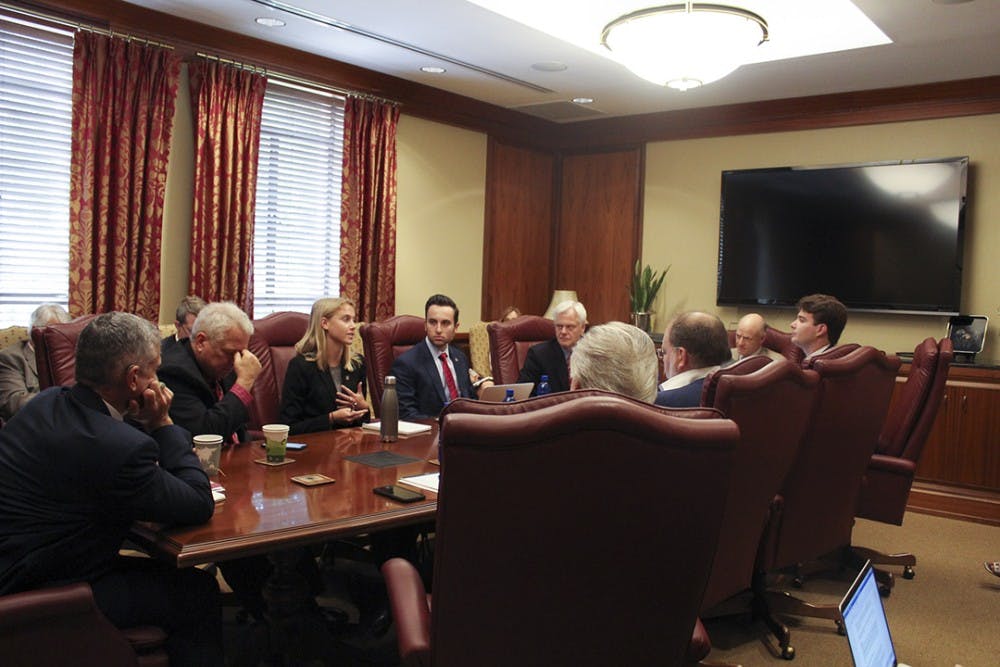The Association of Governing Boards of Universities and Colleges (AGB), an outside consulting firm, found "a fundamentally misguided governance culture" after conducting a "top to bottom review" of the board of trustees.
The review was prompted by the controversy surrounding USC's presidential search process and Caslen's appointment and subsequent concerns about USC losing accreditation.
Last week, the Southern Association of Colleges and Schools Commission on Colleges (SACSCOC), USC's regional accrediting body, released a report stating that USC breached two of the accrediting standards because of "undue influence." Today, AGB is presenting its own review of the board of trustees along with suggestions for how the board should proceed.
“Clearly the trustees’ intention is to add value, yet collectively the board demonstrates limited understanding of how best to do so, likely built over decades of following past practice with little self-examination,” AGB wrote in its report, which is being presented at the board of trustees retreat today.
AGB said ideally, the board of trustees is a fiduciary entity, which is one of the legal responsibilities of the board. The only thing that guides a trustee’s decision-making in this entity is the interest of the university and what good and harm may come to the university as a result of that decision.
The board is currently a more political entity, according to AGB, and fails to prioritize the interests of the university.
“[The board] have a similar culture including, for example: allegiance to a party, reciprocal-benefit bargaining, personal influence based on longevity and power, multiple loyalties, and appeals to another’s self-interest. Predictably, the board also has factions and internal conflicts that do not advance effective governance," said AGB.
AGB says trustees being elected by the legislature make trustees feel responsible to the legislature, subjecting the board to influence or control from these legislators and enhancing political culture.
One-third of the board members have served over 12 years in the voluntary position, and four have served over 20. Most university boards enforce term limits that seldom exceed 12 years. USC does not have term limits in place.
While SACSCOC did not place any sanctions on USC for the breach of standards that were discovered during their review, “the board should not view the lack of action as indicating support for its governances behavior or vindications of the precipitating events.”
In order to amend these shortcomings, AGB recommend the board of trustees must aspire to a fiduciary culture.
“The UofSC System Board of Trustees does not seem to have paid sufficient informed attention to its own operations and structure for years," AGB wrote. "In order to engage in fiduciary governance instead of political governance, trustees and all who work with them need to learn a new game and play by new rules."
ABG outlined in its report ways for the board to effectively shift toward a fiduciary culture.
These include diversifying board membership and input to make up for a lack of information and experience in numerous subjects, governing the [university] by taking more responsibility for its leadership role and actively investing in the other campuses.
AGB also suggests revising board and committee meetings to more effectively discuss issues and plans, providing more in-depth board orientation and governance education when it comes to operating as a fiduciary and ensuring mutual expectations between the university president and board of trustees.
One recommended structural change is eliminating the governor's ex officio position and role as board chair when present at meetings — a role AGB said no other state has designated to the governor, who is rarely present at meetings and often missing the full information as a result.
AGB also emphasized the importance of diversity, stating that in order to accurately represent South Carolina's population, the number of women and minorities would need to increase by five. Seventeen of 19 current board members are white males.
Going forward, AGB stressed the connection between the board and president, recommending that the board should support Caslen and his presidency, especially due to the controversy surrounding his selection.
“As essential as is the board’s support of the president, so must be the president’s respect and engagement with the board and its members on strategic issues and risks. Presidents who are not sufficiently engaged in a partnership with their board are likely to ultimately come up short in their success or tenure.”
AGB will present its report at the board of trustees retreat at the Alumni Center in Columbia. Day one is from 10 a.m. until 5:30 p.m. Day two is from 8:30 a.m. until noon.
Follow our Twitter, @thegamecock, for live coverage of the board of trustees meeting beginning today at 10 a.m.
View the full report here.
Correction: There is a bill in the Senate proposing a reduction in the number of seats on the board. AGB said the size of the board is not an issue of concern.

